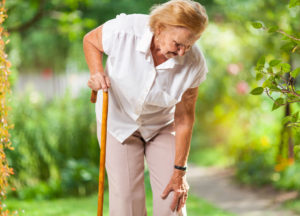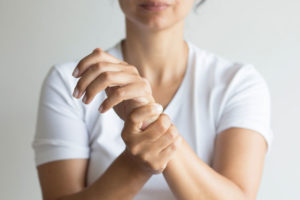It is not unusual to experience joint pain occasionally, particularly if you lead an active lifestyle. Not warming up correctly prior to exercise or injuring muscles, ligaments, or tendons near a joint can lead to pain. Fortunately, this pain is often only temporary. However, if you start to experience chronic aching, pain, or stiffness around a joint, it could indicate a more serious condition, such as arthritis, and may require treatment.
What Is Arthritis?
Arthritis is a common disease that can cause pain, stiffness, immobility, and swelling in a joint. Osteoarthritis is the most common form of arthritis and causes the protective cartilage that covers the ends of bones to gradually break down and wear away. Cartilage is a tough, shock absorbing material that provides a smooth surface to allow bones to easily and painlessly glide against each other during motion. Loss of the protective cartilage lining can cause painful bone on bone rubbing in the joint. Other symptoms can include immobility, swelling, and the formation of boney growths in the affected area.
Rheumatoid arthritis is a chronic inflammatory disease that can lead to deformity and loss of function. It commonly affects the hands but can happen anywhere in the body. Healthy synovium (the protective membrane that covers joints) secretes a lubricant called synovial fluid, which acts as a cushion between joints and ligaments to reduce friction between the bones and prevents wear and tear.
Rheumatoid arthritis causes the synovium to become inflamed, which stops it from working properly. This causes cartilage, bones, and tissues to deteriorate. As swelling occurs, the tendons and ligaments stretch, leading to joint misalignment and deformity. Rheumatoid arthritis is one of the most severe and disabling types of arthritis.
Signs You Shouldn’t Ignore
If you start to notice the following symptoms on a regular basis, you should seek advice from your family medicine provider. It could mean you have arthritis.
1. Swelling, Warmth, Or Redness Around A Joint If you notice swelling or redness around a joint, or if the area feels unusually warm or tender to the touch, it can indicate inflammation around the joint, which can be a symptom of rheumatoid arthritis. It could, however, also indicate an infection or other condition such as gout, so it is best to speak to your family medicine provider to get an accurate diagnosis.
2. Joint Stiffness In The Morning Many people start to feel stiff in the morning when they first wake up, particularly older individuals. This joint stiffness should ease as you begin moving and shouldn’t last more than half an hour or so. If your joint stiffness doesn’t ease as you get moving or lasts for several hours a day or more, it could indicate that you have arthritis.
3. Joint Pain At Night You may not notice joint pain as much during the day when you are moving around and carrying out normal activities. Arthritis pain, however, can become worse during the night. If you are finding a joint, such as your knee, hip, spine, or big toe, causing you pain at night, or your sleep is being severely disrupted as a result of joint pain, it may be time to see a family medicine provider.
4. Discomfort After Exercise It is natural to have some discomfort after strenuous exercise and could be caused by the overstretching of muscles, tendons, or ligaments. However, if you are suffering with pain, discomfort, or stiffness within a joint which has been triggered by being active and is becoming a more frequent problem, it could be a sign of arthritis.
5. You Are Struggling With Day-To-Day Activities If you are finding you have an inability to carry out normal day-to-day activities without joint pain or stiffness, or you are finding yourself avoiding activities that you normally enjoy, you should see a family medicine provider. Temporarily restricting or avoiding certain activities as a result of an injury is normal, but if your lifestyle is becoming increasingly affected by joint pain, this could indicate a chronic joint condition, such as arthritis.
Treatment For Arthritis
Arthritis can be very painful and disabling. Medications, physical therapy, other modalities, and lifestyle adjustments can help to alleviate symptoms. Sometimes, however, surgical treatment may be necessary. Your family medicine provider will be able to help you explore different treatment options available to effectively reduce your joint pain, stiffness, and reduced mobility.
Arthritis Care In Wellington And Royal Palm Beach, Florida
At Advanced Medical Clinic, we offer a high standard of primary and urgent care. Our comprehensive treatment options are designed to help you achieve a better quality of life through management of health conditions, including arthritis.
Dr. Ishan Gunawardeneis an internal medicine specialist and offers continuity of care. For more information about our services, call us today at (561) 434-1935, or request an appointment online.




